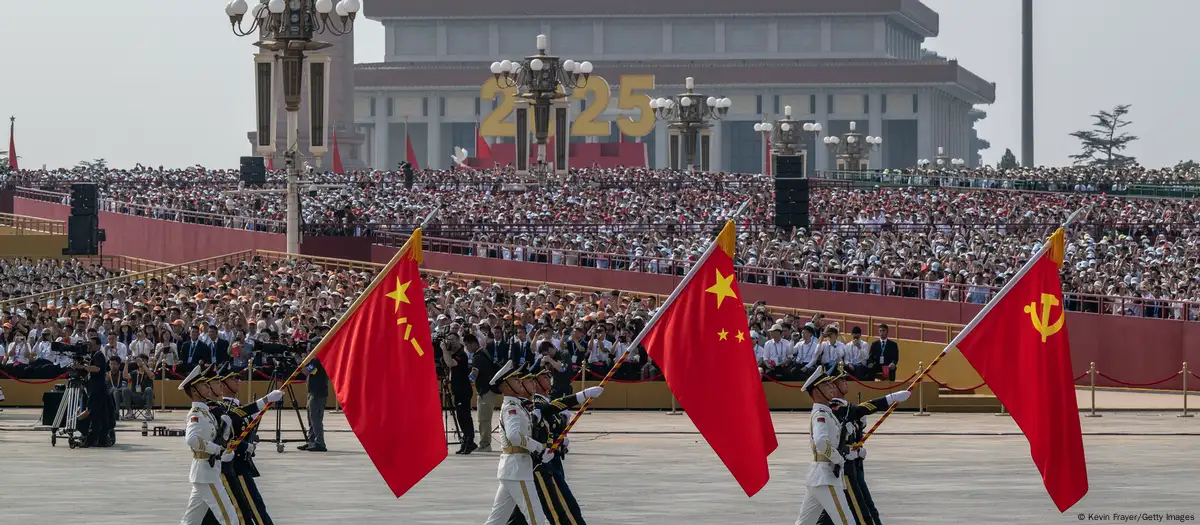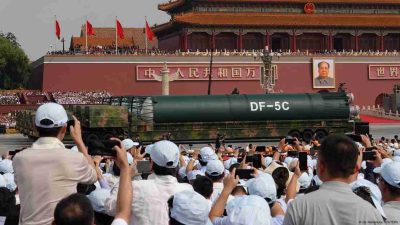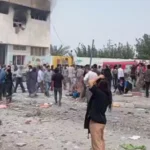
Regime boasts in a military parade with the presence of Xi Jinping and autocratic leaders from around the world, while expanding its economic and political influence in the global south.
It is a demonstration of force and military power: the parade of 12,000 soldiers, the state-of-the-art weapon systems to be used anywhere in the world, the flyers of modern aircraft, and, above all, President XI Jinping as a powerful and unquestionable leader at the Tiananmen door, above the huge portrait of the founder of the nation, Mao Tsé-Tung. These are the images sent by China to the world on Wednesday (03/09) at the ceremony that officially celebrated the 80th anniversary of the end of World War II.
Twenty-six heads of state and government of Asia, Middle East, Africa and Latin America witnessed the show, with Xi positioned to the center, with his right to his right, Russian President Vladimir Putin, and on the left the North Korean dictator Kim Jong-un. Coming from Europe, besides Putin and his belarus ally, Alexander Lukashenko, were present Slovak Prime Minister Robert, and Serbian President Aleksandar Vučić.
From Latin America participated Cuban President Miguel Díaz-Canel. Already Brazil was representing by diplomat Celso Amorim, special advisor of the Presidency of the Republic. Former President Dilma Roussef, now president of Banco do Brics, was also present at the ceremony. The institution is headquartered in Shanghai.
Xi Jinping between autocrats like Putin, Kim and Lukashenko. Brazil was represented by diplomat Celso Amorim (behind the Chinese leader) | Sergei Bobylev/Tass/Picture Alliance
“The rejuvenation of the Chinese nation is unstoppable and the noble cause of peace and the development of humanity will surely triumph,” Xi said, in a speech before tens of thousands of people gathered in the Praça of Heavenly Peace. “The world facing a choice between peace and war, dialogue and confrontation,” added the Chinese leader amid growing geopolitical tensions and challenges to the postwar international order.
Leadership role
Xi’s message is clear: to design China as an alternative to the US dominated international order. In a future world order, China wants to define the rules of the game. “Military parades like this are part of the tool set used in autocracies to demonstrate a supposed or real force,” says consultant Eberhard Sandschneider, Professor of Political Science at Berlin Free University.
Thanks to its economic boom, China is expanding its international political role. Under the command of Xi, this initiative gained a significant boost. The Chinese head of state has a clear view. The processes of modernization in progress must be completed by 2049, the year of the centenary of the Foundation of the Popular Republic. Until then, the Gross Domestic Product (GDP) per capita, for a population of 1.4 billion, should reach the level of an industrialized medium -sized nation.
According to calculations from various consultancies, the East Asia Giant could surpass the US as the world’s largest economy may be in five or at most in 15 years.
Entrepreneurship between Business and Politics
In parallel, China expands its international political leadership through organizations such as the BRICS group and the Shanghai Cooperation Organization (OCX) or through the Global Infrastructure Project known as the New Silk Route.
With 153 participating countries, the new silk route increasingly attracts western countries, for example with the CPEC Economic Corridor through Pakistan, the high -speed railroad and high capacity SGR in Kenya and, more recently, the port of Deep Water of Chancay, Peru.
This business and politics intertwining serves the Chinese purpose of creating a parallel world order in the so -called global south. The Asian Bank for Infrastructure Investment (AIIB) or other Chinese state banks grant loans whenever the Communist Party requests, to achieve the regime’s foreign policy objectives. During the recent OCX summit, the creation of another development bank was announced.
 Nuclear missiles and other weapons were shown at the parade at Praça da Peace Heavenly | GO NAKAMURA/ REUTERS
Nuclear missiles and other weapons were shown at the parade at Praça da Peace Heavenly | GO NAKAMURA/ REUTERS
Requirements regarding labor and environmental protections usually exist only on paper. Chinese contractors receive Chinese money and send Chinese workers around the world. Partner countries bear the debt, which raises dependence: more debt oblige greater obedience to Beijing.
Those who criticize serious human rights violations in the autonomous region of Tibet or among the Muslim minority Uigur in Xinjiang is left out. Those who recognize Taiwan as a Chinese province gains the contract, with rapid and efficient processing and guaranteed financial resources.
This “Chinese model” is criticized in the western world, but gains more and more support in the global south. The former president of Nigeria Olusegun Obasanjo has appealed to African countries to learn from the “Chinese model.” China’s remarkable progress in recent decades is “a source of inspiration and opportunities for Nigeria and Africa,” Obasanjo told Chinese news agency Xinhua.
The United States, formerly the most important international donor, have suspended almost all of their help to development under the new government of Donald Trump. After the USAID Development Agency’s closure, the US President withdrew last week of the budget the nearly $ 5 billion already approved by Congress.
Chinese centralism for export?
The goal of Xi is to “democratize” international relations and oppose “hegemony,” says analyst Claus Soong of the Mercator Institute of Chinese Studies in Berlin. “However, this approach is not rooted in a liberal order or liberal ideas. Its origin lies solely in statism [defesa da autoridade do Estado]in national interests. ”
Diplomats from China’s Foreign Ministry work on a plan to reform “global governance”. China wants to take a leadership role “in the change and development of new forms of international governance.” This would be necessary because global crises are becoming more frequent and international power relations are changing.
Sandschneider says he doesn’t believe Beijing wants to export his government model in this process. “An communist party who ruled alone for over 70 years created a peculiar system. I can’t see China either taking concrete measures [para isso]as we in the West repeatedly tried to promote the export of democracy. ” According to him, China does not interfere with the political order of other countries. These are, above all, resources and today also access to markets. ”
In the midst of this, Europe struggles to defend its democracies as its main partner, the United States, with its unpredictable president, cause a global stir with a trade war. In European Union Member Countries (EU), political parties unfold to form government majorities and prevent right-wing extremists from reaching power. Even so, seven of 27 countries already have governments with the participation of extremists.
“Democracy must be defended against internal and external challenges,” says Soong. “It is threatened when authoritarian regimes expand and require us to abandon democracy in favor of autocracy.”
Originally published by DW on 03/09/2025
Por Dang Yuan
Source: https://www.ocafezinho.com/2025/09/03/china-busca-ultrapassar-eua-como-superpotencia-global/

